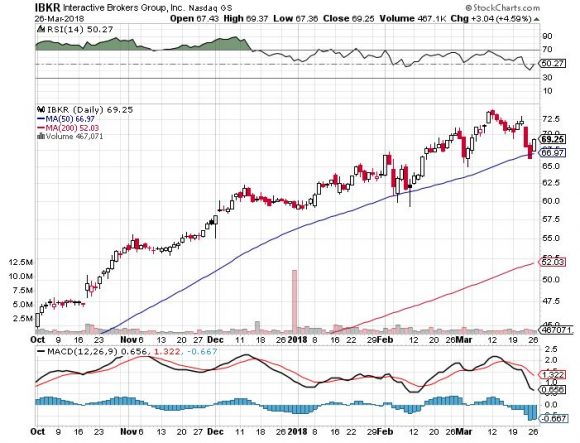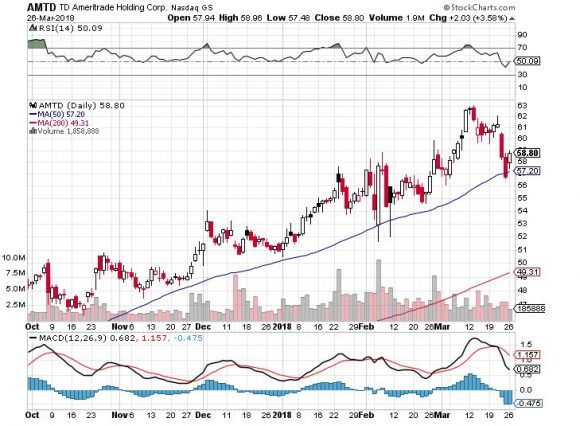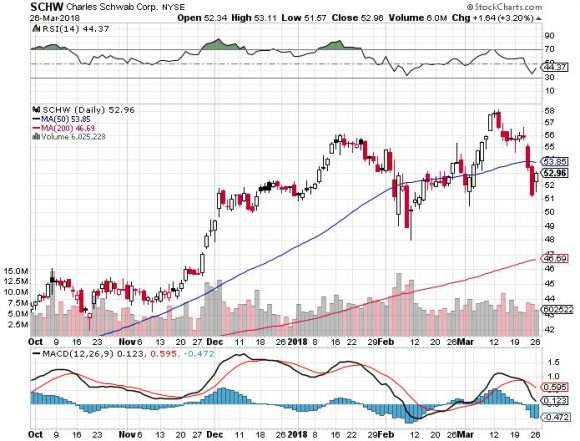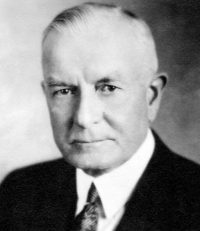Mad Hedge Technology Alerts!
Mad Hedge Technology Letter
March 27, 2018
Fiat Lux
Featured Trade:
(SUDDENLY, INTERACTIVE BROKERS IS A LOT MORE VALUABLE)
(IBKR), (SCHW), (AMTD)
Longtime followers of the Mad Hedge Technology Letter know that I rely on Interactive Brokers (IBKR) for my pricing and execution.
It is fast, accurate, user friendly, and cheap.
Recently, more traders have been discovering these benefits. A lot more.
The halcyon days of January 2018 brought investors euphoria and hockey stick shaped charts.
Bitcoin even tickled the $20,000 mark.
Every risk asset minus interest rate sensitive stock relentlessly exploded skyward.
Then a funny thing happened.
The short volatility industry vanished in the space of one night and unleashed a new epoch of wild market gyrations.
One clear victor rises from the embers of the pandemonium and that is online broker Interactive Brokers Group, founded by Hungarian entrepreneur, Thomas Peterffy.
The all-important gauge of Daily Average Revenue Trades (DARTs), the income stream from generated commission, will hoist the stock to new plateaus.
Total (DART)s rose 14% YOY with historic low volatility in 2017, down 27% from 2016 and (IBKR)'s stock still muscled out performance from $37 to $64, almost doubling.
The recent inflow of February reports indicates fixed-income revenue and currency trading set record highs.
TradeWeb, one of the largest bond trading platforms in the world, reported a 73% February YOY boost of European corporate and financial bonds. Bonds usually are traded via phone, and new trends show the push into electronic trading is advancing unabated.
A return to "normal" levels of volatility will propel online brokers to new heights. Low volatility diminishes trade volume while increased volatility spurs on trading volume.
As more trading traverses to digital platforms, the digitization of buying and selling stocks and the advent of crypto trading will entice risk-adverse Millennials to pile into risk assets.
Numbers show that Millennials have an affinity for options trading, suggesting the dynamic short termism of options provides the experiential thrill they seek in life.
Interactive Brokers was voted best of breed of online brokers in 2018 by the prominent financial publication Barron's. This annual edition gives the skinny on online trading platforms and a rough guide to which service best suits each investor.
I single out (IBKR) as a stellar company because the e-broker industry is experiencing a mammoth period of consolidation amid a price war.
E-brokers such as Fidelity slashed its commission rates from $7.95/trade to $4.95/trade in February 2017. As trading becomes commoditized, it's a race to the bottom and whoever is a volume leader with the best platform technology will be the last one standing.
This trend all favors (IBKR) which is positioned for scale like the FANGs. If customers do not possess the scale, the ultra-cheap commissions are unavailable.
The backdoor strategy here is the access e-brokers have to customer data flows. The treasure trove of trade flow data will become even more valuable with the upward re-pricing of data following the Cambridge Analytica mess.
Online brokers profit off customers' data by selling the information to High Frequency Traders (HFT) that input the data into evolving proprietary algorithms, which legally front run retail and institutional money.
(IBKR) fits (HFT) like a glove and the synergies are robust. The most lucrative accounts derive from the new batches of prop desks and hedge funds that trade heavily, desiring the best online platform technology for minimal slippage and smooth execution. (HFT)s trade in milliseconds and comprise 60% to 70% of daily trading volume, signifying immense bullishness for (IBKR).
The strategy so far is a winner, increasing customer accounts by 25% YOY, up to 483,000 in Q4 2017. Profit margins benefited as well, rising 15% to 71% YOY.
The second part of (IBKR)'s handiwork is net interest. Margin accounts due to fractional banking allow brokers to lend to clients. Any serious trader is using leverage to amass profits. At the height of financial malpractice in 2007, too-big-to-fail banks boasted leverage of 50x.
Total customer equity elevated by 46% YOY to $124.80 billion. IBKR also profits from the cash sitting in its own accounts, which accumulate higher relative returns from higher interest rates.
(IBKR)'s margin rates are lowest in the industry and still incredibly lucrative.
Every time the Fed raises the Fed funds rate, (IBKR) can ring in the cash register. The Fed is on an aggressive quantitative tightening agenda and a good omen for the upcoming earnings' report.
The trends ongoing in this industry overwhelmingly favor (IBKR). The shift to mobile will become more pervasive. Only a few years ago, mobile platforms were arcane and unintegrated with desktop platforms, forcing traders to disregard the mobile method.
Times have changed and (IBKR) cannot find enough developers to head its operations. The shortage of talented developers is causing a backlog of new projects, but this highlights the growing emphasis on its trading platform technology.
Offerings don't stop at trading execution. (IBKR) has built out a robo-advising service called IB Asset Management and via iBot, an A.I. assistant, traders can use prop-desk level algorithms to nimbly dip in and out of positions. The analytical features to dissect price data is breathtaking these days and will satisfy chart lovers.
The runway is long as the eye can see because many of these offerings can be transformed into reoccurring subscription services. Furthermore, brokers make money if the market ascends or declines as long as traders do something to stockpile data.
Other competitors to consider are Charles Schwab (SCHW), which recently acquired optionsXpress and TD Ameritrade (AMTD), which purchased Scottrade for $4 billion. (AMTD) cut 1,100 employees in the St. Louis, MO, branch lately and, in return, will replace them with a handful of techies to work on platform enhancement.
The broad-based consolidation reflects the grab for market share since many of the players have come to terms with the market's obsession for scale. Implementing scale directly means snagging more client accounts as the marginal cost per client barely budges with the tech infrastructure already established for all the big players.
__________________________________________________________________________________________________
Quote of the Day
"I think there is a world market for maybe five computers." - IBM Chairman Thomas J. Watson, 1943
Mad Hedge Technology Letter
March 26, 2018
Fiat Lux
Featured Trade:
(MICRON TECHNOLOGY KNOCKS THE COVER OFF THE BALL)
(MU), (WDC)







